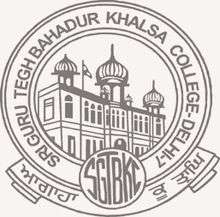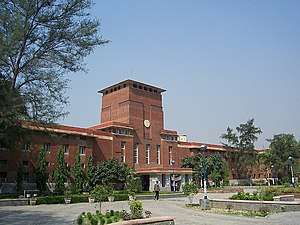Sri Guru Tegh Bahadur Khalsa College
Sri Guru Tegh Bahadur Khalsa College is a constituent college of the University of Delhi. Established in 1951, it is one of the oldest and most prestigious institutes for science, commerce and arts in India.[1] In 2018, the highest admission cut-off was 99.66 per cent for B.Sc (Hons) in Electronics in SGTB Khalsa College. In the humanities stream, Khalsa College had set the highest cut-off at 99 per cent for BA (Hons) in Political Science.[2]
 Seal of SGTB Khalsa College, Delhi | |
| Motto | ਅਘਾਹਾ ਕੂ ਤ੍ਰਾਘਿ (Punjabi) Aghāhā Kū Trāghi |
|---|---|
Motto in English | Look Forward |
| Type | Coeducation |
| Established | 1951 |
| Principal | Jaswinder Singh |
| Undergraduates | ~4700 |
| Location | , India |
| Campus | North Campus |
| Affiliations | University of Delhi |
| Website | sgtbkhalsadu |
The college has 59 classrooms, 19 labs, 6 research labs, indoor and outdoor sports facilities, gymnasium, cafeteria, bank, and medical facilities in proximity, besides other utility services such as post-office and market. The college is well connected by road and Delhi Metro link, and majority students are day-scholars. A hostel for girls can accommodate 147 students, and a hostel for boys is planned to come up soon.
The infrastructure of the college is one of the best in the university with air-conditioned classrooms with projection facilities and Internet, campus-wide wired as well as a wireless network having Internet connectivity, with 24x7 Internet in campus and an overall computer-student ratio of 1 : 2.95. [3]
| College rankings | |
|---|---|
| General – India | |
| NIRF (Colleges) (2020)[4] | 30 |
Rankings
It is ranked 30th across india by National Institutional Ranking Framework in 2020.
History
Sri Guru Tegh Bahadur Khalsa College, a constituent college of the University of Delhi, was established in 1951 and has been, since, maintained by Delhi Sikh Gurudwara Management Committee (DSGMC), a statutory body established under an act of the Parliament of India. The focus of the college at the time of inception was to ensure a comprehensive social transformation through access to quality education, in particular to young Punjabi refugees of partition in 1947, and to conserve and promote Punjabi language, culture, and heritage. The college is named after the Ninth Guru of Sikhism Sri Guru Tegh Bahadur, who sacrificed his life to uphold secular values and is an institution with the cosmopolitan environment and progressive outlook. Khalsa College is a constituent of the University of Delhi. The college began in four rooms in a school in Dev Nagar with 49 students and a faculty of 6. It moved to its present location in 1973.
Placement
The Placement Cell of Shri Guru Tegh Bahadur Khalsa College is a full-fledged training and placement cell which periodically liaises and interacts with the corporate world in order to explore the possibility of training and job placement of students. Apart from bringing a varied list of recruiters to the campus, the Placement Cell organises talks, study abroad seminars, internship opportunities and workshops for the collective student body. Training and Placement Cell of the college provides following facilities at the college premises.
- Conducting mock personal interviews and group discussions to make students aware of the selection procedures
- Summer industrial training, internship and final placement of students.
- Conducting industrial visits and industry-oriented training programmes.
- Invite professional guest speakers to impart necessary inputs for the above-mentioned activities.
Major recruiters
Major companies visit the campus at the annual placement drive wherein the average package ranges from 20 to 25 thousand per month. Some of the major recruiters at Shri Guru Tegh Bahadur Khalsa College are as follows: [5] E&Y, KPMG, Deloitte, PWC, Zomato, SBI, Grant Thorton, TCS, Wipro, Tech Mahindra, IBM Daksh, Genpact, ICICI Prudential, S&P Global Market Intelligence, Protiviti and Housing.com.
Programmes
Over the years, the college has carved a niche for itself and is known to be one of the leading colleges of university. At present, there are 18 undergraduate programmes, two B.Tech. programmes, 12 postgraduate programmes, one postgraduate diploma, two undergraduate diplomas, and 9 certificate courses, making a total of 44 programmes. As of the session 2015–16, there were 3,768 students in these programmes, and 140 full-time teachers, out of which 101 permanent. During last four years, 57 teachers participated in various staff-development programmes. The college offers the following courses:
- B.A. (program)
- B.A. (Hons)
- B.A. (Hons) in Business Economics also known as B.B.E.
- B.Com.(Hons)
- B.Com. (Programme)
- B.Sc. (Hons) in Botany
- B.Sc. (Hons) in Chemistry
- B.Sc. (Hons) in Computer Science
- B.Sc. (Hons) in Electronics
- B.Sc. (Hons) in Mathematics
- B.Sc. (Hons) in Physics
- B.Sc. (Hons) in Zoology
- B.Sc. in Life Science
- B.Sc. in Physical Science
- PG Diploma Forensic Science
- Certificate Course in Web Journalism
- Certificate Course in Sports Economics and Marketing
- Certificate Courses in French, German, Spanish and Italian.
Sports
The college has a spacious playing field for hockey, cricket, and football, and facilities for indoor games like table tennis, carom, and chess, as well as a mini gymnasium. The Sant Harchand Singh Longowal Sports Complex consists of a gymnasium. A squash racket room, three table tennis rooms, and changing rooms for players are also in this complex. The college has a floodlit lawn tennis court. The Khalsa Tennis Academy has been set up to utilize the infrastructure and nurture fresh talents, supervised under former Indian Davis Cup player Balram Singh. The college, along with Ramjas College and Shri Ram College of Commerce, was one of the rugby training venues for the 2010 Commonwealth Games.
College societies
Academic societies
- BA Program Society;Festival:Revel
- Aakriti – the zoology society
- Catenation- The Chemistry Society
- Raah – the Business Economics society; festival: Perspica; society magazine: Bizonomist
- Comsoc- The Commerce Society; Festival: Comzone. The Business Café(TBC) is the editorial board of Department of Commerce. The department has its own line of bi-monthly e-business magazine, BizGeist. The inaugural edition of BizGeist was uncovered by Dr. Saudamini Das (NABARD Chair Professor at Indian Institute of Economic Growth). TBC also publishes the annual department magazine, Spectracom.[6]
- Ecotryst – economics society; festival: Convergence and Annual Economic Conclave; Society Magazine: E-Quest
- English Literary Society; festival: Arabesque
- Hindi Sahitya Sabha – the Hindi literary society; newspaper: Aagaaz
- Punjabi Literary Society
- Dāstaan – The History Society
- Physics and Electronics Society
- Prakriti – botany society
- Polis- political science society, festival- Eudaimonia
- Aavritii – The Electronics society
- Curieux – The Computer Science Society
- Junto - The Civil Services Society
The college magazine, The Tegh, consists of English, Hindi and Punjabi sections.
Co-curricular and extracurricular societies
- ENACTUS Khalsa - Enactus is a global community of business, academic, and student leaders which is dedicated to making the world a better place through entrepreneurial action. As an Enactus society, we are on the constant look-out for prevalent social problems which can be solved through entrepreneurial action. Enactus Khalsa is SGTB Khalsa’s chapter of the global initiative, and seeks to reinforce the ideal that our initiative can provide sustainability to a growing world. Our flagship project, Project Aagaaz, aimed to uplift 40 Afghani women who have the skill to work with crochet.
- ETRAM – The Western dance society
- Confero – the Model United Nations Society. The society is operated by its dedicated member students belonging to various academic streams to debate and conduct discussions on a wide range of geo-political, economic and social issues existing in our world. Regular groups sessions along with simulations of various United Nations committees such as the General Assembly, U.N. Security Council, U.N.S.C.W. and other sessions on novel conferences such as the I.A.E.A and The 1999 Kargil War Council are conducted by the society conforming to prescribed international rules and diplomacy to enable its members to exponentially broaden their world-view and see global and local issues in a new light and formulate prospective solutions and raise awareness about international affairs that are relatively less famous.
- Swarang – the music society.
- Acrostic – poetry society. This was founded in 2012 by three students Niyati, Shakti and Malini under convenorship of Novy Kapadia and held its maiden poetry recitation event in October 2012 with poets, professors and students of various colleges of Delhi University in attendance.
- Pinhole – photography society. This was founded in the academic year 2012–13, and held its first successful exhibition in October, where they showcased works of the society members.
- DADS – debate and discussion society. This was founded in 1970s. The society has trained students who have established their names in the national debating circuit and have won various inter-college, inter-university and National level competitions. Currently it organises Intercollege Debate competitions, Parliamentary Debate & Youth Parliaments annually. This is enumerated in one of the best debating societies of Delhi University.
- Anhad – divinity society
- Environmental Club
- Vigour – Bhangra and Gidha society
- Renaissance – fashion society; deactivated
- Trendsetterz – choreography and dance society. The first president of the society, Shaily Tandon, led the choreography team.
- Strokes – fine arts society
- Ankur – Dramatics society
- NSS Khalsa - The national social scheme which continuously makes efforts in making our society better with agendas like to educate the penurious children, planting trees and organising various events such as plays and marathons for edification about social issues.
College principals
- G.S. Talib, 1951-1952
- Sachdev Singh, 1952-1954
- G.S. Mansukhani, 1954-1955
- Prof. Niranjan Singh, 1955-1957
- G.S. Bal, 1957-1971
- Gurdip Singh Randhawa, 1971-1992
- Udham Singh, 1988
- Tirath Singh, 1988-1995
- D.S. Claire, 1995-2005
- Jaswinder Singh, 2005–present
Academic work
The college has undertaken projects in the field of ciliate zoology and has reported new species of protozoans from Northeast India. It collaborates with the Natural History Museum, London and University of Camerino.
It offers a dual credential programs in collaboration with University of the Fraser Valley and Avans.
Notable alumni
- Saurabh Shukla, actor, director and scriptwriter
- Rabbi Shergill, singer and musician
- Arvinder Singh Lovely: Minister of Education and Transportation, Delhi government
- Maninder Singh: former cricketer turned commentator
- Shyam Lal: former gymnast, represented India twice in Olympics; Arjuna winner
- Mohinder Amarnath, former cricketer
References
- http://www.sgtbkhalsadu.ac.in/abt.jsp
- "Delhi University issues first cut-off, LSR asks 98.75% for B.A - Times of India". The Times of India. Retrieved 5 January 2019.
- "Welcome :: Shri Guru Teg Bahadur Khalsa College University Of Delhi Powered By :: Redox Systems Pvt. Ltd". www.sgtbkhalsadu.ac.in. Retrieved 5 January 2019.
- "National Institutional Ranking Framework 2020 (Colleges)". National Institutional Ranking Framework. Ministry of Education. 11 June 2020.
- "Welcome :: Shri Guru Teg Bahadur Khalsa College University Of Delhi Powered By :: Redox Systems Pvt. Ltd". www.sgtbkhalsadu.ac.in. Retrieved 5 January 2019.
- https://thebizcafe.wordpress.com/editorial-board-report-2018-19/
